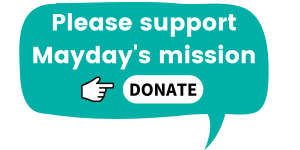What is power?
Alistair Shand, PTS Coach at Mayday Trust, looks at the importance of a question that isn’t often asked. What is power and what role should it take when working with people going through tough times?
“What is power?”
The question took me by surprise. Sitting there as someone pretty familiar with job interviews, with my guard firmly up, having rehearsed every competency-based question under the sun in preparation – this question definitely caught me unawares.
From previous job interviews I had learned that there was a fairly predictable formula to practice in order to perform well. And I’d prepared in a similar way for my interview for the position of PTS Coach with Mayday Trust. The work was very different to what I had been employed to do before, but I assumed the interview approach would be much the same as any other organisation. One size fits all. They probably just wanted to know if I could do the job, not what I was like as a person.
“What is power?”
That’s what they were asking me. In a job interview? Seems a bit deep, I thought to myself. In reality though, I found the question much less scary to answer than perhaps 10 run-of-the-mill, competency-based questions. Not because I knew lots about power and could give a really clever answer, but because it was a question which was seeking to learn about my own values. It was an open question with no right answer. It was designed to get past my polished interview technique and to understand a bit more of what makes me tick as an individual.
As I grow more into the role of an PTS Coach I often find myself reflecting on the influence of power dynamics when working with people going through tough times.
“What is power?” still seems like an extremely relevant question as I go to work 6 months into the job.
Empowerment is one of the key principles of the Personal Transitions Service. As coaches, we are there to champion the abilities and strengths of the people we work with. The way I work should at every opportunity seek to give power to the person, to encourage them make their own choices and to recognise their own unique gifts and talents. People should feel supported, but responsible for their own choices, whether they are homeless or not. If I hold all the power as a professional, then this can’t really happen.
When reflecting on my own journey to becoming an Asset Coach at Mayday, I realised that without feeling empowered to make a significant change to the kind of work I did, I probably wouldn’t have made any changes at all. I would have stayed in jobs that paid well enough but offered me little in the way of fulfillment or purpose. In other words, jobs that weren’t really right for me.
That feeling of empowerment for me took a number of forms. It was having a wife who was happy for me to explore what I really wanted to do, rather than to accept the status quo at a time when we had plenty of other things to worry about. It was also friends and even former colleagues who encouraged me to explore and take risks as I pondered next steps. It was a personal belief that work could be more than doing my hours and making a wage – it could help people in a real way.
I was supported to go and explore a new path and then make a choice which I would own and take responsibility for, whether it went well or not. So far, it has turned out much better than I could have foreseen.
Fostering this sense of empowerment is vital to coaching in the Personal Transitions Service. It is the encouragement of people we work with to utilise the strengths they possess (because everybody has strengths), to help them move forward and build a better future for themselves.
And so, as I meet with people going through really tough times day by day, I’m convinced that the surprising interview question: “What is power?” is in fact fundamental to the way the Personal Transitions Service works and my role as a Coach.
Whether it’s having a weekly meeting in the weights room of a gym rather than a coffee shop, because this is a place where someone I work with feels more comfortable; or being ready to admit that I know nothing about sound engineering, story-based video games, changing a car tyre or how to put a roof on a house; but that I’d be really interested to learn. Suddenly, by relinquishing some of my own control over a situation or a conversation, power is transferred to the other person and they can hopefully take the lead.
A potentially intimidating one to-one situation is transformed into something more real world and authentic. Of course it can take a while to build this, but it’s worth taking the time to try.
Power imbalances are very real. Especially when working alongside people going through tough and often traumatic situations. But I’m learning that by relinquishing some power myself, and giving people space and time to explore options and try new things, then a person can be empowered to step up and hopefully choose the path that they want to take forward.


